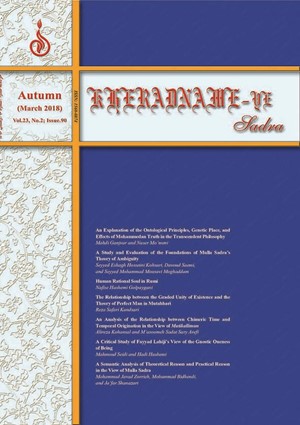-
-
List of Articles
-
Open Access Article
1 - A Critical Study of Fayyad Lahiji’s View of the Gnostic Oneness of Being
mahmoud saidi hadi hashemi -
Open Access Article
2 - A Semantic Analysis of Theoretical Reason and Practical Reason in the View of Mulla Sadra
Mohammad Javad Zorrieh Mohammad Bidhendi Jafar Shanazari -
Open Access Article
3 - An Explanation of the Ontological Principles, Genetic Place, and Effects of Mohammedan Truth in the Transcendent Philosophy
Mahdi Ganjvar Naser Momeni -
Open Access Article
4 - سرمقاله
Seyyed Mohammad Khamenei -
Open Access Article
5 - A Study and Evaluation of the Foundations of Mulla Sadra’s Theory of Ambiguity
-
Open Access Article
6 - Human Rational Soul in Rumi
Nafise Hashemi Golpaygani -
Open Access Article
7 - The Relationship between the Graded Unity of Existence and the Theory of Perfect Man in Mutahhari
Reza Safari Kandsari -
Open Access Article
8 - An Analysis of the Relationship between Chimeric Time and Temporal Origination in the View of Mutikallimun
Alireza Kohansal M‘asoomeh Sadat Sary Arefi
-
The rights to this website are owned by the Raimag Press Management System.
Copyright © 2017-2026







